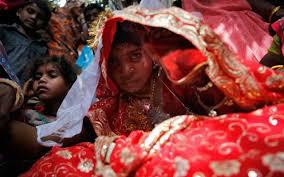
Bangladesh must do more to tackle child marriage if it is to meet its own goal of eliminating the crime by 2041, according to a United Nations report released on Wednesday.
“This human rights violation...(is)robbing children of their childhoods,” said Veera Mendonca, a spokeswoman for the U.N.’s children agency.
“We must invest now to secure girls’ rights to life and education, and reduce their exposure to violence and exploitation,” she said during the launch of the report.
Bangladesh has 38 million girls who wed before they were 18, according to the U.N., equivalent to almost half the nation’s female population.
While the rate of child marriage in Bangladesh has dropped to 51% from more than 90% in 1970, the country still has the highest rate of underage marriage in South Asia and ranks among the 10 worst offenders in the world.
The legal minimum age of marriage in Bangladesh is 18 for women and 21 for men.
More than 190 U.N. member states, including Bangladesh, committed to eliminating child marriage when they adopted the Sustainable Development Goals in 2015.
SCHOOLS SHUT
Schools in Bangladesh have been closed since March due to the COVID-19 pandemic, which has killed about 5,400 people in the country. Campaigners say the prolonged closure and widespread economic hardship threaten to worsen the situation.
“As children and families cope with school closures, loss of income and increased pressure in the home, there are heightened risks of child marriage,” said the report.
“Even during normal times married girls are over four times more likely to be out of school than unmarried girls,” it added.
The Bangladesh government, which launched a National Plan of Action in 2018 to eliminate the crime, says the impact of its crackdown on underage marriage will not be felt for years.
Measures taken include the opening of youth clubs, better access to education for girls and campaigns to spread awareness.
“It will take some time to truly see the impact of these policies. It took us a while to start implementing them. I am hopeful of making better progress, ” said Abul Hossain of Bangladesh’s women and children’s ministry.
Source: Reuters
https://www.reuters.com/article/idUSL8N2GY3UO
 FR
FR EN
EN AR
AR








